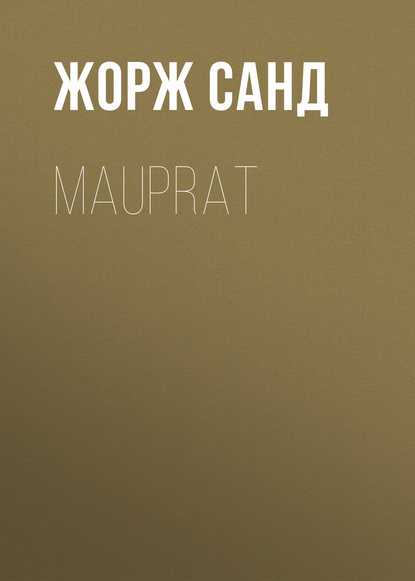По всем вопросам обращайтесь на: info@litportal.ru
(©) 2003-2024.
✖
Mauprat
Настройки чтения
Размер шрифта
Высота строк
Поля
“‘I am not afraid. I have given proofs of my repentance; I have expiated my sins.’
“‘Hypocrite!’
“‘Come, now, hold your tongue, you madman!’ said the other. ‘I must leave you. There is some money.’
“‘That all?’
“‘What do you expect from a monk? Do you imagine that I am rich?’
“‘Your Carmelites are; and you can do what you like with them.’
“‘I might give you more, but I would rather not. As soon as you got a couple of louis you would be off for a debauch, and make enough row to betray yourself.’
“‘And if you want me to quit this part of the country for some time, what do you suppose I am to travel with?’
“‘Three times already I have given you enough to take you away, haven’t I? And each time you have come back, after drinking it all in the first place of ill-fame on the frontier of the province! Your impudence sickens me, after the evidence given against you, when the police are on the watch, when Bernard is appealing for a fresh trial. You may be caught at any moment!’
“‘That is for you to see to, brother. You can lead the Carmelites by the nose; and the Carmelites can lead the bishop, through some little peccadillo, I suppose, done together on the quiet in the convent after supper.’”
Here the president interrupted Patience.
“Witness,” he said, “I call you to order. You are outraging a prelate’s virtue by daring to retail such a conversation.”
“By no means,” replied Patience. “I am merely reporting a drunkard’s and a murderer’s invectives against the prelate. They do not concern me in the least; and every one here knows what value to put upon them; but, if you wish, I will say no more on this point. The discussion lasted for some time longer. The real Trappist wanted to make the sham Trappist leave the country, and the latter persisted in remaining, declaring that, if he were not on the spot, his brother would have him arrested immediately after Bernard’s head had been cut off, so that he might have the whole inheritance to himself. John, driven to extremities, seriously threatened to denounce him and hand him over to justice.
“‘Enough!’ replied Antony. ‘You will take good care not to do that, I know; for, if Bernard is acquitted, good-bye to the inheritance!’
“Then they separated. The real Trappist went away looking very anxious; the other fell asleep, with his elbows on the table. I left my hiding-place to take steps for his arrest. It was just then that the police, who had been on my track for some time to force me to come and give evidence, collared me. In vain did I point to the monk as Edmee’s murderer; they would not believe me, and said they had no warrant against him. I wanted to arouse the village, but they prevented me from speaking. They brought me here, from station to station, as if I had been a deserter, and for the last week I have been in the cells and no one has deigned to heed my protests. They would not even let me see M. Bernard’s lawyer, or inform him that I was in prison; it was only just now that the jailer came, and told me that I must put on my coat and appear in court. I do not know whether all this is according to the law; but one thing is certain, namely, that the murderer might have been arrested and has not been; nor will he be, unless you secure the person of John Mauprat to prevent him from warning, I do not say his accomplice, but his protege. I state on oath that, from all I have heard, John Mauprat is above any suspicion of complicity. As to the act of allowing an innocent man to be handed over to the rigour of the law, and of endeavouring to save a guilty man by going so far as to give false evidence, and produce false documents to prove his death.”
Patience, noticing that the president was again about to interrupt him, hastened to end his testimony by saying:
“As to that, gentlemen, it is for you, not for me, to judge him.”
XXVIII
After this important evidence the trial was suspended for a few minutes. When the judges returned Edmee was brought back into the court. Pale and weak, scarcely able to drag herself to the arm-chair which was reserved for her, she nevertheless displayed considerable mental vigour and presence of mind.
“Do you think you can answer the questions which will be put to you without unduly exciting yourself?” asked the president.
“I hope so, sir,” she replied. “It is true that I have recently been seriously ill, and that it is only within the last few days that I have recovered my memory; but I believe I have completely recovered it, and my mind feels quite clear.”
“Your name?”
“Solange-Edmonde de Mauprat; Edmea sylvestris,” she added in an undertone.
I shuddered. As she said these unseasonable words her eyes had assumed a strange expression. I feared that her mind was going to wander still further. My counsel was also alarmed and looked at me inquiringly. No one but myself had understood these two words which Edmee had been in the habit of frequently repeating during the first and last days of her illness. Happily this was the last sign of any disturbance in her faculties. She shook her beautiful head, as if to drive out any troublesome ideas; and, the president having asked her for an explanation of these unintelligible words, she replied with sweetness and dignity:
“It is nothing, sir. Please continue my examination.”
“Your age, mademoiselle?”
“Twenty-four.”
“Are you related to the prisoner?”
“He is my second cousin, and my father’s grand-nephew.”
“Do you swear to speak the truth, the whole truth?”
“Yes, sir.”
“Raise your hand.”
Edmee turned towards Arthur with a sad smile. He took off her glove, and helped to raise her arm, which hung nerveless and powerless by her side. I felt big tears rolling down my cheeks.
With delicacy and simplicity Edmee related how she and I had lost our way in the woods; how I, under the impression that her horse had bolted, had unseated her in my eager anxiety to stop the animal; how a slight altercation had ensued, after which, with a little feminine temper, foolish enough, she had wished to mount her mare again without help; how she had even spoken unkindly to me, not meaning a word of what she said, for she loved me like a brother; how, deeply hurt by her harshness, I had moved away a few yards to obey her; and how, just as she was about to follow me, grieved herself at our childish quarrel, she had felt a violent shock in her breast, and had fallen almost without hearing any report. It was impossible for her to say in which direction she was looking, or from which side the shot had come.
“That is all that happened,” she added. “Of all people I am least able to explain this occurrence. In my soul and conscience I can only attribute it to the carelessness of one of the hunting party, who is afraid to confess. Laws are so severe. And it is so difficult to prove the truth.”
“So, mademoiselle, you do not think that your cousin was the author of this attempt?”
“No, sir, certainly not! I am no longer delirious, and I should not have let myself be brought before you if I had felt that my mind was at all weak.”
“Apparently, then, you consider that a state of mental aberration was responsible for the revelations you made to Patience, to Mademoiselle Leblanc, your companion, and also, perhaps, to Abbe Aubert.”
“I made no revelations,” she replied emphatically, “either to the worthy Patience, the venerable abbe, or my servant Leblanc. If the meaningless words we utter in a state of delirium are to be called ‘revelations,’ all the people who frighten us in our dreams would have to be condemned to death. How could I have revealed facts of which I never had any knowledge?”
“But at the time you received the wound, and fell from your horse, you said: ‘Bernard, Bernard! I should never have thought that you would kill me!’”
“I do not remember having said so; and, even if I did, I cannot conceive that any one would attach much importance to the impressions of a person who had suddenly been struck to the ground, and whose mind was annihilated, as it were. All that I know is that Bernard de Mauprat would lay down his life for my father or myself; which does not make it very probable that he wanted to murder me. Great God! what would be his object?”
In order to embarrass Edmee, the president now utilized all the arguments which could be drawn from Mademoiselle Leblanc’s evidence. As a fact, they were calculated to cause her not a little confusion. Edmee, who was at first somewhat astonished to find that the law was in possession of so many details which she believed were unknown to others, regained her courage and pride, however, when they suggested, in those brutally chaste terms which are used by the law in such a case, that she had been a victim of my violence at Roche-Mauprat. Her spirit thoroughly roused, she proceeded to defend my character and her own honour, and declared that, considering how I had been brought up, I had behaved much more honourably than might have been expected. But she still had to explain all her life from this point onward, the breaking off of her engagement with M. de la Marche, her frequent quarrels with myself, my sudden departure for America, her refusal of all offers of marriage.
“All these questions are abominable,” she said, rising suddenly, her physical strength having returned with the exercise of her mental powers. “You ask me to give an account of my inmost feelings; you would sound the mysteries of my soul; you put my modesty on the rack; you would take to yourself rights that belong only to God. I declare to you that, if my own life were now at stake and not another’s, you should not extract a word more from me. However, to save the life of the meanest of men I would overcome my repugnance; much more, therefore, will I do for him who is now at the bar. Know then – since you force me to a confession which is painful to the pride and reserve of my sex – that everything which to you seems inexplicable in my conduct, everything which you attribute to Bernard’s persecutions and my own resentment, to his threats and my terror, finds its justification in one word: I love him!”
On uttering this word, the red blood in her cheeks, and in the ringing tone of the proudest and most passionate soul that ever existed, Edmee sat down again and buried her face in her hands. At this moment I was so transported that I could not help crying out:
“Let them take me to the scaffold now; I am king of all the earth!”
“To the scaffold! You!” said Edmee, rising again. “Let them rather take me. Is it your fault, poor boy, if for seven years I have hidden from you the secret of my affections; if I did not wish you to know it until you were the first of men in wisdom and intelligence as you are already the first in greatness of heart? You are paying dearly for my ambition, since it has been interpreted as scorn and hatred. You have good reason to hate me, since my pride has brought you to the felon’s dock. But I will wash away your shame by a signal reparation; though they send you to the scaffold, you shall go there with the title of my husband.”
“Your generosity is carrying you too far, Edmee de Mauprat,” said the president. “It would seem that, in order to save your relative, you are accusing yourself of coquetry and unkindness; for, how otherwise do you explain the fact that you exasperated this young man’s passion by refusing him for seven years?”
“Perhaps, sir,” replied Edmee archly, “the court is not competent to judge this matter. Many women think it no great crime to show a little coquetry with the man they love. Perhaps we have a right to this when we have sacrificed all other men to him. After all, it is a very natural and very innocent ambition to make the man of one’s choice feel that one is a soul of some price, that one is worth wooing, and worth a long effort. True, if this coquetry resulted in the condemnation of one’s lover to death, one would speedily correct one’s self of it. But, naturally, gentlemen, you would not think of atoning for my cruelty by offering the poor young man such a consolation as this.”
After saying these words in an animated, ironical tone, Edmee burst into tears. This nervous sensibility which brought to the front all the qualities of her soul and mind, tenderness, courage, delicacy, pride, modesty, gave her face at the same time an expression so varied, so winning in all its moods, that the grave, sombre assembly of judges let fall the brazen cuirass of impassive integrity and the leaden cope of hypocritical virtue. If Edmee had not triumphantly defended me by her confession, she had at least roused the greatest interest in my favour. A man who is loved by a beautiful woman carries with him a talisman that makes him invulnerable; all feel that his life is of greater value than other lives.
Edmee still had to submit to many questions; she set in their proper light the facts which had been misrepresented by Mademoiselle Leblanc. True, she spared me considerably; but with admirable skill she managed to elude certain questions, and so escaped the necessity of either lying or condemning me. She generously took upon herself the blame for all my offences, and pretended that, if we had had various quarrels, it was because she herself took a secret pleasure in them; because they revealed the depth of my love; that she had let me go to America to put my virtue to the proof, thinking that the campaign would not last more than a year, as was then supposed; that afterwards she had considered me in honour bound to submit to the indefinite prolongation, but that she had suffered more than myself from my absence; finally, she quite remembered the letter which had been found upon her, and, taking it up, she gave the mutilated passages with astonishing accuracy, and at the same time called the clerk to follow as she deciphered the words which were half obliterated.

















